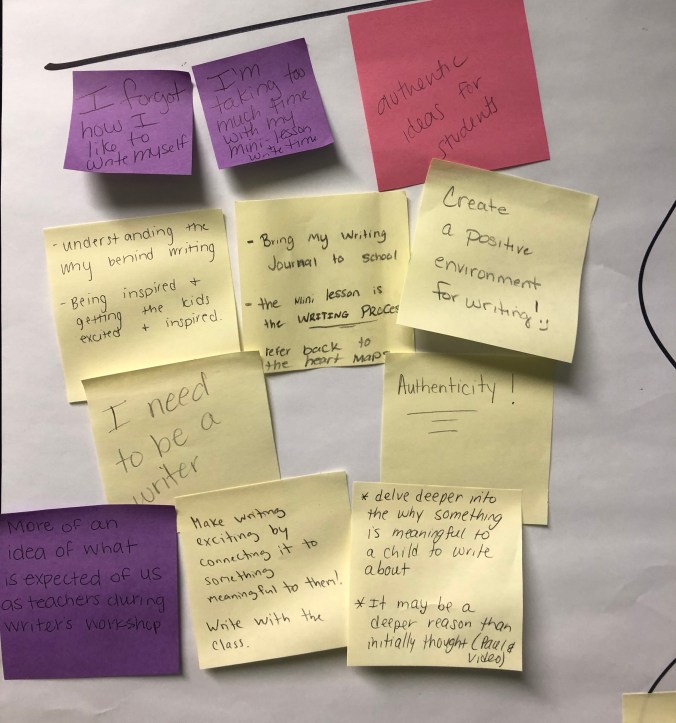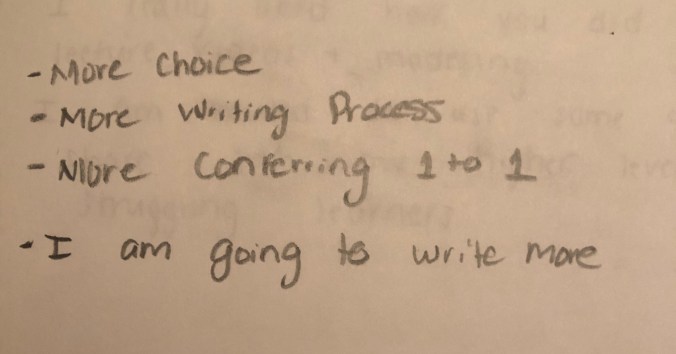
I wasn’t sure how the day would go.
There were a lot of strikes against it before it even started.
Normally when I facilitate writing workshop training for teachers they’ve specifically signed up for it. They want to be there. This year, due to an oversight somewhere at the district level, the workshops weren’t scheduled. At the last minute, this workshop training was added as Day Two of Balanced Literacy (as Day One focused only on reading).
Meaning that teachers who signed up learned that they had two whole-day sessions to attend instead of one.
How would they feel about that?
Normally the overview of writing workshop alone is spread across three afternoons. Now I had to condense it all into one day.
Nothing like prioritizing content . . .
And, with the adoption of a new curriculum, writing workshop—and balanced literacy—won’t be offered to K-5 teachers any more. Just to K-2.
I felt I’d landed in no man’s land on some dismal shore, ineffectively beating back the waves of despair crashing all about me.
But I chose to keep my footing on a solid foundation, to hang onto all that I value about writing and teaching writing. The lifeline. Not just for me, but for the children, for their teachers.
This has to be worth their while, I sighed to myself.
And I got to work revising the training.
The day of reckoning comes. I start with who we are and why we’re here, rolling right into the what of writing workshop: Create the conditions for good writing to occur (credit Donald Graves). Understanding that writing workshop is not a program, is not about a product, but is a time set aside to fall in love with the craft (my definition) and to learn the real writing process.
Then we go deeper, into the why of writing. It’s at the very core of being human.
I read aloud to my participants:
Five-year-old Paul writes. Children want to write before they want to read. They are more fascinated by their own marks than by the marks of others. Young children leave their messages on refrigerators, wallpaper, moist windowpanes, sidewalks, and even on paper.
Six-year-old Paul doesn’t write. He has gone to school to learn to read. Now that he is in school, the message is, “Read and listen; writing and expression can wait.” Paul may wait a lifetime. The odds are that he will never be truly encouraged to express himself in writing.
Paul will wait and wait to write because a higher premium is placed on his ability to receive messages than on his ability to send them. Individual expression, particularly personal messages in writing, will not be valued as highly as the accurate repetition pf the ideas of others, expressed in their writing. Since Paul will write so little, by the time he graduates from high school he will think of himself as a poor writer and will have a lowered sense of self-esteem as a learner. He will have lost an important means of thinking and will not have developed his ability to read critically.
-Donald Graves, Children Want to Write
I notice, as I read this, how heads begin to nod in acknowledgment . . .
Next we read portions of two articles with quotes from people in the business world. How young would-be employees have a hard time organizing their thoughts and articulating them, and that, when possible, employers should hire the better writer, because writers understand how people work, have better interpersonal skills . . .
We read these even though the participants of this training are K-2 teachers.
Because this is where all the writing begins.
Here, with them.
Then I read a bit from Colleen Cruz in The Unstoppable Writing Teacher, how a boy, Robert, discovers what his personal essay is really about. This is in a chapter entitled “I’m Finding Some Student Writing Repetitive and Boring.” Cruz writes: “Kids, and some adult writers, have a subconscious need to write about particular topics, but they don’t understand why.” Robert had chosen the topic ‘Christmas is my favorite holiday.’ His reasons are food, presents, and videos. While conferring with Cruz, Robert finally says that watching videos is the most important thing about the holiday because his family had recorded every Christmas; he goes deeper and deeper into the meaning, until: “Since my dad died, Christmas is the only time I get to see him. My mom can’t stand to watch all the videos at any other time. But on Christmas she lets us watch them, and it’s like we’re all together again.”
The why of teaching writing: We owe it to the children to find their stories, to tell them.
It begins with our finding and telling our own.
Here’s where I carve out time to write in this workshop training. We lift lines from our writing to create an interactive poem; we brainstorm for more writing with heart maps (credit Georgia Heard).
At this point, I have to gently ask the teachers to stop writing.
For we’ve reached the how of writing workshop, beginning with minilessons. The vehicle for teaching standards and process, for modeling, for creating that atmosphere, those conditions, for good writing to occur. Opening the windows for student ideas to flow. Choice, voice. Meaning and mattering.
And it’s time for lunch. I tell the teachers that when they return, we’ll spend the rest of the afternoon on the backbone of writing workshop: Conferring. It merits its own what, why, and how. Academic feedback in the effort to reach a goal, growth versus grades, meeting each child, each writer, individually . . . .
As they exit, the teachers seem happy. They leave sticky notes with their “gots” and “wants” on a chart. Personally I celebrate that the “gots,” pictured at the top of this post, far outnumber the “wants.”
Their notes revive my spirits. I’ve a sense of standing on a shore just as the sun breaks through the clouds. I feel the warmth of it. I can almost hear distant gulls, or something, calling and calling, wild and free; I can taste promise like salt in the breeze.
We’re not even done; we’ve only just begun.
I believe it’s gonna be a great day, after all.
*******



-Bits of the teachers’ final reflections at the end of the day.
Yahoo! I sure felt your uncertainty as you approached your challenge, but it sounds like it all came together beautifully! Lucky teachers, lucky kids!
LikeLiked by 1 person
This is what great PD does, it fires up the participants to embrace new ideas or reminds them of possibilities. How sad for 3-5 teachers to not have workshop/balanced literacy as an option for instruction. I loved the way you drew them in, you didn’t just tell, but showed. 🙂
LikeLiked by 1 person